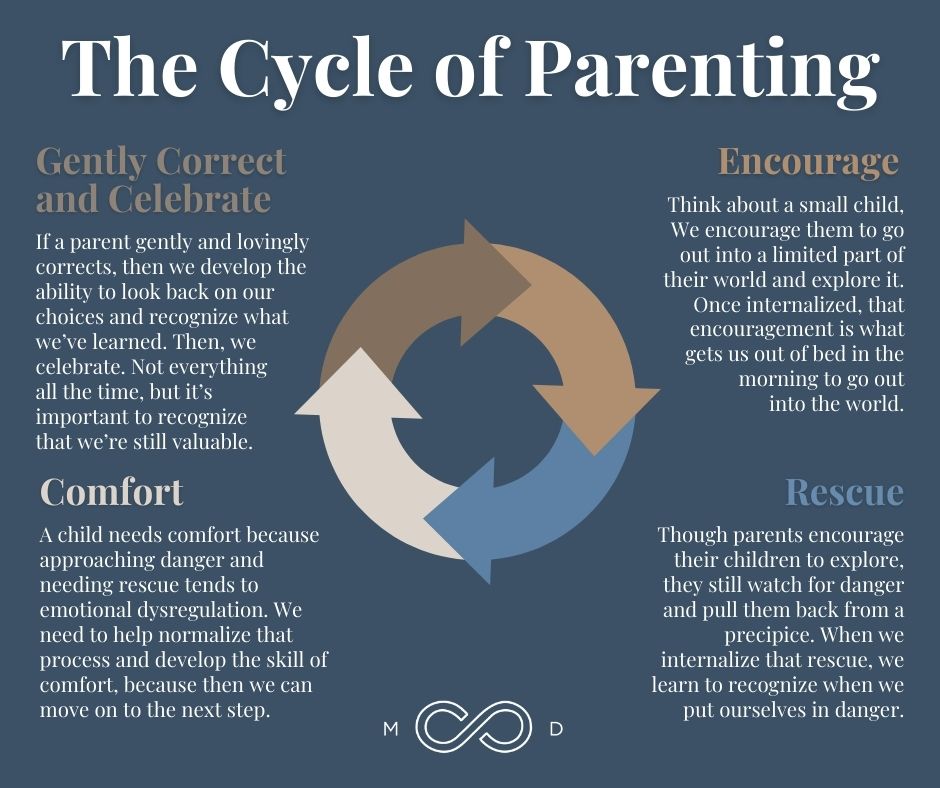Download file | Play in new window | |
Before we dive in, I just want to tell you: I cannot stress how important this topic is for so many people who struggle with internal dialogue, conflict, and kindness with themselves.
Parenting oneself is an incredibly powerful and rich concept introduced in previous episodes by this month’s podcast guest, Dr. Brian Hooper — psychotherapist, pastoral counselor extraordinaire, and dear friend of mine. Together, we dug deep to discover further application, beauty, and power in this subject.
Parenting yourself may not be what you think, but it’s more than what you expect.
What Is Parenting Yourself?
In his psychotherapy practice, Dr. Hooper has noticed people are often really in need of the voice of an inner parent to help them address their life issues. But for many people, a number of milestones in the parenting process never became internalized as they were growing up.
He puts it this way: If a parent does their job really well, then the child takes that and swallows it. It becomes alive in them, and they begin to do it for themselves.
If the parent does a half-decent job, then the child can only do a half-decent job of the same thing as they grow into an adult. There may be pieces missing.
Consequently, much of what Dr. Hooper does is help introduce the skillsets people never integrated when growing up.
Many people aren’t even aware they should’ve gotten a certain skill from Mom and Dad. An awareness of that void can help them understand, perhaps, why they have a certain struggle. Dr. Hooper’s goal is to bring awareness to the deficit, then help people develop that missing skill.
The four parenting skills we’re talking about in this context comprise a cycle. They include:
- Encourage
- Rescue
- Comfort
- Gently correct and celebrate
Encourage
Think about a small child. When they’re learning to crawl and then walk, we encourage them to go out into a limited part of their world and explore it. As they get older, their capability expands and we tell them to go out and play, or to pet a new puppy, or to try a new sport. Once internalized, that encouragement is what gets us out of bed in the morning to go out into the world.
Rescue
Though parents encourage their children to explore, they still watch for danger and pull them back from a precipice. When we internalize that rescue, we learn to recognize when we put ourselves in danger — and not necessarily physical danger. It could be physical, or it could be an intangible danger, like putting your job in jeopardy by taking long lunches too often.
Comfort
Soothe. Console. Comfort.
A child needs these synonymous balms because approaching danger and needing rescue tends to cause fear, panic, and meltdown. A more adult term might be emotional dysregulation. People can start to feel like their world is coming apart and become overwhelmed by the emotion that stems from needing rescue.
At some point, we’re all going to venture out and realize the choice we made wasn’t wise. We need to help normalize that process and develop the skill of comfort, because then we can move on to the next step.
Gently Correct and Celebrate
If a parent gently and lovingly corrects, we develop the ability to look back on our choices and recognize what we’ve learned. We can also evaluate how we want to do things differently going forward — an incredibly important life skill as we grow up.
Then, we celebrate. Not everything all the time, but it’s important to recognize that we’re still valuable with something unique to offer. Yes, I may not have done that perfectly, but I don’t want to lose track of my other attributes. I don’t want to become a perfectionist who’s hypercritical of myself.
All Together
These four skills are really a cycle of growth, because all growth takes place at the edge. But if you had a negative experience of putting a toe over the edge and getting hurt without anyone to rescue or comfort you, you may never cross that line again. Or, if you grew up internalizing a thought that the edge is a terrible place full of danger and no reward, why would you ever explore the horizon?
Everything that’s worth doing has some risk involved. When you explore the edges, that’s where you learn how to navigate risk better. And some things, once navigated well, lose the risk — and you can go even further.
What Can Parenting Yourself Look Like?
A couple of executives Dr. Hooper works with have both said, “I spent far too much time on one troubling employee.”
The first step is to trace that back. Why aren’t they going through with the process of correcting them, waiting to see if the employee responds to that correction, and then making a decision to keep or terminate them? That’s a fairly uncomplicated and standard process.
But both individuals, who don’t know each other, have identified this as a place where they get stuck.
Likely, the source is confrontation. In both cases, Dr. Hooper suggests confrontation was something highly discouraged or emotionally punished in the home in which they grew up. They had to placate people in order to survive.
It’s a situation in which these executives are having to encourage themselves to go to a place that’s uncomfortable for them, and then rescue themselves by recognizing that NOT taking action will incur further problems for them and their companies. As they take action in their place of danger, they need to console themselves by putting it in context: I’m fine. I’m taking it one step at a time. I’m following the protocol. Someone might not like the result, but it’s perfectly fine to take the action, to document, and, if need be, to terminate.
A friend of Dr. Hooper’s has a different situation. She’s a consultant, and the situation was that she provided a service, but she wasn’t specific about the limitations of that service. Consequently, her client had different expectations of what the service would include.
She said, I’ve already gone above and beyond what should be expected for the service that I offered… but I don’t suppose I can expect that to be recognized.
She’s right. Because she didn’t set the expectation, she now has to fulfill the expectations of her client. But her realization of this led to a gentle self correction. She’s now creating a client form with boxes to check, so it’s crystal clear what she does and does not promise. She’s gotten more business over the last six months because she has encouraged herself, and she’s not down on herself.
Highly responsible individuals often don’t have much trouble on the encouragement front, but they can be extremely hard on themselves. In many cases, they suffer from imposter syndrome, and the only person that’s really criticizing them is themselves. Anxiety, uncertainty, and catastrophizing run rampant.
The missing piece might be consolation — the ability to soothe themselves when they start getting really anxious. Or it might be celebration, thinking, How can I celebrate? There’s still more to accomplish. Their ever-expanding list of things to do imprisons their sense of satisfaction and robs them of joy.
Many of us miss out on the joy of staying in the process. We’re waiting to arrive in order to celebrate. But the fact is, we spend most of our time not stepping over thresholds but journeying from one threshold to another. That’s where our lives are happening — in the process, creating, planning, building and executing.
This is a deeply spiritual issue, being truly awake — the first of Dr. Hooper’s pillars of spirituality.
Spirituality is all about our deepest connection to our most authentic selves, to others, and a sense of the all. That’s what spirituality is about at its core, and that transcends all religions.
People need to be awake to what’s going on inside of them, between them and others, and around them in the world. They need to be awake to the goodness and sweetness of life — and what’s happening on the way from one threshold to another.
It means not losing sight of the joy of raising a child, or embracing a lover, or planning a vacation with your spouse.
Staying in that process — being awake to it and the depth of connection — that’s what fuels the encouragement to get out of bed, the self rescue, the consolation, the loving correction of oneself, and finally, the celebration.
Takeaways You Can Use Now
What we’re talking about here are the pillars of parenting, and how we apply them in a healthy, holistic way to fuel deep, authentic connections with ourselves and with others in the world. We begin this process with encouraging, which leads to a need to be rescued. Then we need comfort and gentle correction, followed by celebration — which should feed into more encouragement to go farther.
So how can you identify an internal deficit in one of these skills?
Audit for Friction
Ask yourself, where is the friction? Where is my pain point, my discomfort? This often manifests as anxiety, but it could also be depression. Identify your lived inner experience in these areas.
Maybe you don’t have any problem with encouragement or exploration, but you do sometimes have a hard time rescuing yourself from that inner perfectionist.
When you find that point of friction, reverse engineer how it got there. What’s the origin? Then begin to put other practices in place to undo that source of friction and overcome it.
Breathe From the Heart
For instance, practicing heart-centered breathing is a practical way to learn how to calm yourself. It lowers blood pressure, reduces heart rate, and promotes coherence.
In fact, the heart actually sends more information to the brain than the brain does to the heart. When we engage in soothing heart-centered breathing, it sends a message to the brain that puts us in a flow state. A fog lifts. Concentration becomes sharper. Things just get easier.
This is one of the best places to begin — just learning how to soothe ourselves so the thing that went wrong isn’t a catastrophe. When we can calm ourselves, we don’t need some of those crutches we as a species so often turn to, like taking a drink or a Xanax.
Audit How You Talk to Yourself
We work with so many people who say one of two things:
I’m not enough.
Or,
I’m not good enough.
Soothing yourself, getting calm, accepting yourself, and loving yourself is where the healing begins. If you say things to yourself like I’m such an idiot or I’m so stupid, we need to work on that.
In 2011, Dr. Hooper adopted a West Highland Terrier. He was a backyard breeder’s dog, kept in a crate, only brought out to stud, and not house trained. He was clearly depressed. But Dr. Hooper brought him home and accepted and loved him just the way he was.
And then he started changing. That little dog taught an important lesson for all of us: You can only change what you first accept and love.
Final Thoughts
Remember, all progress starts with telling the truth. Being able to notice something true about yourself and how you feel is a beautiful place to begin a journey to acceptance. Let’s be honest with ourselves.
If you’d like to learn more about Dr. Hooper and his work, visit his website.

Dr. Aaron Wenzel is a concierge physician specializing in the care of fast-moving entrepreneurs, executives, and public figures in the Nashville, TN area. Dr. Wenzel’s diverse life experience and extensive training in family medicine, emergency care, nutrition, and hormone replacement therapies give him the unique platform to provide unmatched care for his patients.







